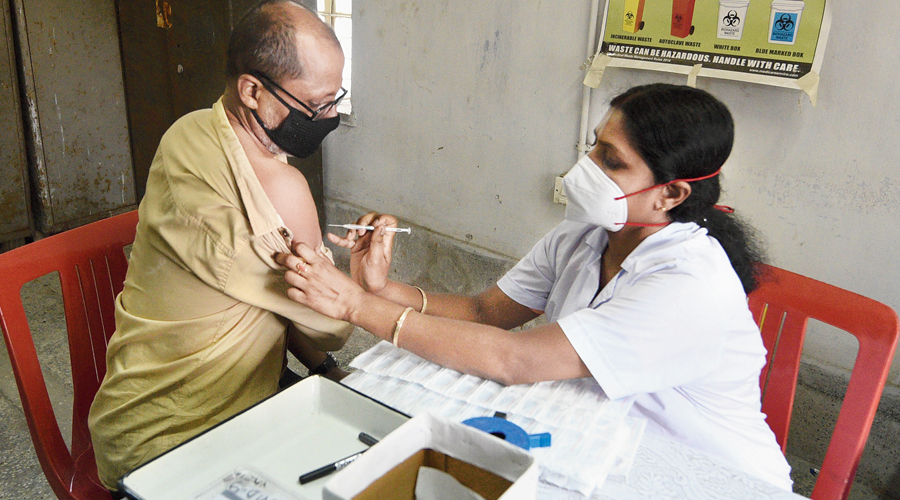TT Bureau, Agencies | New Delhi | 30.04.21: The Supreme Court Friday said the Centre should adopt a national immunisation model for vaccination of all and not leave it to private vaccine manufacturers to decide on its allocation to states.
A bench headed by Justices D Y Chandrachud said, "What happens to the marginalised people and SC/ST population living in far flung areas? Should they be left to the mercy of private vaccine manufacturers and hospitals? They will not be able to pay for the vaccines,” it said.
The bench, also comprising Justices L Nageswara Rao and S Rabindra Bhat, said that the government must think of providing free of cost vaccination to all citizens.
You should adopt a national immunization model to vaccinate people of all classes. Poor or marginalised sections will not go to the hospital and pay Rs 600 for vaccines. You should consider all these aspects, the bench told Solicitor General Tushar Mehta, appearing for the Centre.
It said that it cannot be left to the private manufacturers to decide how much quantity be given to which state and instead Centre should procure all the vaccines and give it to the states like done in national immunization programmes.
The top court asked the Centre to respond to at least 10 questions, for instance, how it will ensure registration of persons for vaccination, who are illiterate or don't have access to the internet, considering that registration on CoWIN app is mandatory for vaccination for persons aged 18-45 years.
It asked Mehta whether the Centre or states had attempted to undertake targeted vaccination drives for crematorium workers and other coordinate groups who are providing on-ground assistance during the pandemic and weren't considered as frontline workers.
The bench asked Mehta to respond to the question whether the central government had considered exercising its power under section 92 of Patents Act, 1970, which enables compulsory licensing of patents in a public health emergency?
Has the Finance Ministry made any previous grants/ sanctions to Bharat Biotech and Serum Institute of India (SII) in the past, like the current infusion of Rs 1,500 crore and Rs 3,000 crore respectively? If yes, what is the exact breakup, as against the total cost of development and production of the two vaccines, the bench said.
It also sought to know the direct and indirect grant/aid that was provided for the research, development and manufacture of vaccines.
The top court posted the matter for further hearing on May 10 and asked the Solicitor General to reply to the questions it has posed.
The 10 questions
- What is being done to provide treatment to healthcare professionals who are contacting Covid-19?
- How much investment has the Centre made into the vaccine companies and given advances in the last year? What has been the financial contribution by the Union govt in research etc in the development of vaccines?
- Can a mechanism be developed to show real-time updates regarding the allocation of oxygen?
- How will the Centre ensure registration for vaccines for illiterate people and those without internet access as registration through Co-Win is mandatory in the third phase of vaccination?
- Will one state get priority access over another in getting the vaccines?
- How will the Centre ensure equity by private vaccine manufacturers when it is buying only 50 per cent of the doses?
- Has the centre considered invoking Section 92 of the patents act and issue compulsory licenses so that drugs can be manufactured while the royalty is sorted?
- Has the testing labs been directed to track the mutant variant of Covid-19?
- How is the Centre trying to regulate hospital charges? Is there a national policy?
- Why are we paying so much for this vaccine which AstraZeneca is providing at a far lower price to the US citizens?
Hospital admisions
The Supreme Court also asked the Centre to frame a national policy on admission of patients in hospitals after it was apprised that some of them in the NCR are seeking local address proof for admitting Covid-19 infected people, while it was hearing the suo motu case on Covid management.
The Centre will have to make a uniform policy for admission of patients, the bench observed.
The court said the central government should ensure that no local address proof of patients are sought by hospitals for admission, after a lawyer said that a patient was denied admission at a hospital in Noida as his Aadhaar Card had a residential address of Mumbai.
The top court warned authorities, from the Centre down to police chiefs, against silencing people and their pleas for help on the presumption that they are raising false grievances on the internet.






0 Response to " ‘What happens to marginalised people?’ Govt must think of free Covid vaccination for all, says SC"
Post a Comment
Disclaimer Note:
The views expressed in the articles published here are solely those of the author and do not necessarily reflect the official policy, position, or perspective of Kalimpong News or KalimNews. Kalimpong News and KalimNews disclaim all liability for the published or posted articles, news, and information and assume no responsibility for the accuracy or validity of the content.
Kalimpong News is a non-profit online news platform managed by KalimNews and operated under the Kalimpong Press Club.
Comment Policy:
We encourage respectful and constructive discussions. Please ensure decency while commenting and register with your email ID to participate.
Note: only a member of this blog may post a comment.